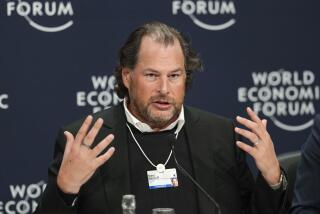Herbalife shares fall on fund manager’s queries
- Share via
You would think a better-than-expected 22% profit jump might convince investors that nutritional-supplement purveyor Herbalife Ltd. is still on a solid global growth track.
Not when Greenlight Capital hedge fund manager David Einhorn drops in on the L.A. multilevel-marketing company’s conference call with analysts and investors.
Einhorn is known for his frequent short-selling bets that stocks are going to decline. All it took Tuesday was his asking what analyst Timothy Ramey called “basic” questions about Herbalife’s distribution system for its weight-loss shakes, fitness formulas and energy boosters.
In reaction, investors dumped the stock — sending it plunging 26% before it closed down $14.02, or 20%, at $56.30.
“Mr. Einhorn is a very big deal in the investment world,” said Ramey, who follows Herbalife for D.A. Davidson & Co. “If he has a negative point of view, people will sit up and take notice.”
Ramey, a fan of the company, reaffirmed his “buy” recommendation on Herbalife after the shares tumbled. He saw the drop as “a major buying opportunity” for a stock he expects to hit $150 a share within five years.
“I didn’t hear anything on the call that would indicate anything other than this will continue to be a great growth stock,” Ramey said.
It wasn’t clear exactly how Einhorn might have invested in Herbalife. He previously has bet successfully against companies including Green Mountain Coffee Roasters Inc. and Lehman Bros., before the Wall Street firm’s 2008 collapse.
He declined to comment for this article.
During the conference call, Einhorn asked for details about the hierarchy of supervisors, distributors and consumers through which the company’s products reach the markets. Herbalife President Desmond J. Walsh said 70% of sales were direct to users or consumed personally by distributors.
Einhorn followed up by asking why the company stopped breaking out figures categorizing its lower-end distributors as self-consumers, small retailers or potential sales leaders.
“I didn’t view it as valuable information to the business or to the investors,” replied John DeSimone, the chief financial officer. He said he’d be happy to email the breakout to Einhorn. “Our objective is to be completely transparent.”
“That’ll be helpful,” Einhorn said. “Thanks — thanks so much, guys.”
Herbalife had reported a surge in earnings late Monday, saying its net income for the first quarter was $108.2 million, or 88 cents a share, compared with $88.7 million, or 71 cents a share, a year earlier. Sales rose 21% to $964.2 million.
In a statement late Tuesday, the company said Einhorn had “raised no new subjects or concerns. They were elementary questions usually asked by investors new to our industry. These are issues that have been thoroughly addressed before.”
Herbalife added that the decline in the stock price represented an opportunity to buy back shares, noting that it has the authority to spend $428 million doing so. The company is based in the Cayman Islands, but much of its operations are conducted out of offices in Los Angeles.
“Our business fundamentals are very strong and we are confident in our financials, our disclosures and our network marketing business method,” the company said.
The sell-off was only the latest in a long series of blowups at the 32-year-old company, whose successes have included finding enthusiastic promoters in Russia and Mexico.
Early on, Herbalife settled government suits accusing it of false claims and improper marketing using an “endless chain” scheme. Congress held hearings on its products. Ownership disputes repeatedly took the company private and then public again.
And in 2000 came the capper: founder Mark Hughes’ death at 44 in his Malibu mansion after a four-day drinking binge. His death was ruled accidental and the result of a combination of alcohol and an antidepressant.
But in recent years all that seemed so much excess weight from the past. Herbalife’s revenue rose 49%, from $2.3 billion to $3.5 billion, from 2009 to 2011, and net income more than doubled to $413 million. Investors liked that: The stock price had jumped elevenfold from March 2009 through late April this year.
“This was an excellent quarter from an excellent company with high ethics and strong accounting,” Ramey said. “We have no problem remaining bullish no matter who is asking the questions.”
More to Read
Inside the business of entertainment
The Wide Shot brings you news, analysis and insights on everything from streaming wars to production — and what it all means for the future.
You may occasionally receive promotional content from the Los Angeles Times.











